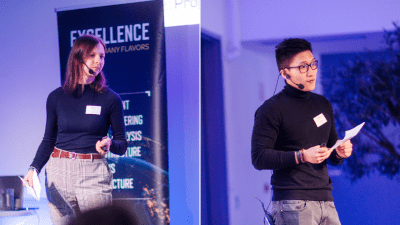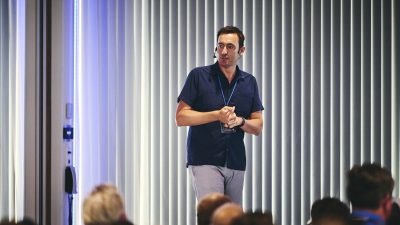This website uses cookies. More information Do not show this message
Stories about: digitalization
-
 The challenges of being a Transformation Consultant 3 August 2023
The challenges of being a Transformation Consultant 3 August 2023At the latest Meeting of the Minds, our Business Tribe gave a presentation about ‘Agile transformation in a big company’. Which challenges does change hold, […]
-
 16 technology conferences that you cannot miss 13 September 2022
16 technology conferences that you cannot miss 13 September 2022It might seem like a silly question, but why would you go to a conference? In our busy, online-driven society, it’s easy to forget how important being in a face-to-face, in-person setting is.
-
 TRUE OR FALSE: Statements about working in the financial sector 16 August 2022
TRUE OR FALSE: Statements about working in the financial sector 16 August 2022What is a job in finance really like? Can you really have a positive impact on society or are you just a small step away from becoming the next Wolf of Wallstreet?
-
 Roadmap for a Digital Future in Belgium 30 September 2020
Roadmap for a Digital Future in Belgium 30 September 2020Belgian companies need help to focus on digitalization. So it’s time to come up with a pragmatic action plan, packed with concrete initiatives to facilitate digital transformation. The kick-off of this initiative was given on the 15th of September, when some of Belgium’s most important digital leaders (full list at the end of the article) got together for an inspiring roundtable discussion.
-
 Why this is the book you should read on your next holiday 23 July 2019
Why this is the book you should read on your next holiday 23 July 2019If you’re starting to think about which books to take to the beach this year, we suggest 21 Lessons for the 21st Century by renowned historian Yuval Noah Harari. In this blogpost, we’ll discuss four of its most crucial lessons and show you exactly why it deserves a spot on your summer reading list!
-
 Companies will have to create radical digital sustainability 2 April 2019
Companies will have to create radical digital sustainability 2 April 2019Industry 4.0 is ushering in a new era of exponential change, rapid disruption and regulatory challenges on a scale never seen before. But Raf Seymus, Founder & CEO of Exellys, believes that the future for businesses is extremely bright: “While many jobs will be automated out of existence, many more new jobs will be created,” he predicts.
-
 I believe in the collaboration between man and machine 28 March 2019
I believe in the collaboration between man and machine 28 March 2019Acronyms such as IoT, AI, and ML can make it easy to feel overwhelmed by the challenges presented by Industry 4.0 (i4.0). But according to Veerle Lozie, VP of Operations and IT at Melexis, there’s no need to worry. “The opportunities will be huge for everyone”.
-
 Industry 4.0 is going to change life fundamentally 25 March 2019
Industry 4.0 is going to change life fundamentally 25 March 2019For me Industry 4.0 is about hacking. We can alter genes and create super humans, we can produce new molecules in order to make new materials and we can even squeeze time. It’s no longer science-fiction. The Fourth Industrial Revolution is here and, according to Jurgen Ingels, Serial Entrepreneur & Investor, this is how we should tackle it.
-
 Government can enhance trust in technology 20 March 2019
Government can enhance trust in technology 20 March 2019The technologies driving Industry 4.0 have already started to change the way we live, work and interact with each other. Robotics, infotech, biotech, and nanotech are fundamentally reshaping the way that we live. According to Philippe De Backer, Minister of Digital Agenda, the fact that Industry 4.0 will be driven by technology means that up to two-thirds of people will have to be retrained and reshaped in the next ten to fifteen years.
-
 Technology can turn this planet into a garden of Eden 18 March 2019
Technology can turn this planet into a garden of Eden 18 March 2019From autonomous vehicles to digital assistants and self-healing materials, the lines between the biological, physical and digital spheres are being blurred before our eyes. Change is happening at an exponential speed and the emergence of cyber-physical systems shows us that the Fourth Industrial Revolution is already underway. Yet according to Erwin Verstraelen, Chief Digital & Innovation Officer at the Port of Antwerp, many people are unprepared for the challenges that lie ahead.
-
 What you need to thrive in Industry 4.0 20 February 2019
What you need to thrive in Industry 4.0 20 February 2019In five years, over one-third of skills that are considered important in today’s workforce will have changed. Innovations such as artificial intelligence, quantum computing, genetic editing and more are no longer science fiction but near future. Companies need to embrace this technological and digital (r)evolution and talent needs to be prepared today in order to tackle the innovations of tomorrow.
-
 Reimagining work in the age of AI 8 January 2019
Reimagining work in the age of AI 8 January 2019It’s 2019. Take a look around you. Far from being the stuff of science fiction, Artificial Intelligence (AI) has already become an indispensable part of your daily life. But are robots coming for our jobs?
-
 Man of steel: Where the steel industry and IT come together 6 September 2018
Man of steel: Where the steel industry and IT come together 6 September 2018When you match an industrial engineer with an innate passion for oversized swords with an internationally renowned steel company like Arcelor Mittal… you just know you’re a winner! But how do the steel industry and IT come together?
-
 The five best talks from JS/CSSConf in Berlin 7 August 2018
The five best talks from JS/CSSConf in Berlin 7 August 2018Three front-end developers are sitting on a plane. What happens next? Not too long ago Stijn, Steven & Yoran, three Exellys consultants of the ING team attended the JS and CSS Conferences in Berlin. When they came back, we asked them to select their five favorite talks. So sit back, grab some popcorn (and maybe a note book) and let’s get started!
-
 The hackathon aftermath 17 April 2018
The hackathon aftermath 17 April 2018We organised a kick ass hackathon. The challenge? Crack the code of private banking. Not an easy thing to do. Almost 30 young hackers and hustlers came to Antwerp to take a shot at glory and more importantly to win a 4 day trip to Lisbon’s Web Summit, the largest tech event in Europe.
-
 Disrupting disruption: What the heck is a Hashgraph? 10 April 2018
Disrupting disruption: What the heck is a Hashgraph? 10 April 2018Hashgraph DLT technology is a superior consensus protocol with a unique data distribution structure. It may be a much better alternative to current blockchain technology. The project is still under development and there is no public version of it yet. Nevertheless, it’s interesting to follow the development of this technology to see where it might lead.
-
 Data Trinity: What you should know about the Data Big Three 20 March 2018
Data Trinity: What you should know about the Data Big Three 20 March 2018We are fast approaching the ‘Data Age’, an entirely new era that will see the rise of everything from humanoid robots to autonomous vehicles and more.The power that this data will bring is virtually limitless and will change the way we communicate, work and live. Within the global datasphere work can be categorized into three main areas: Data Science, Big Data and Data Analytics.
-
 The ultimate guide to finding a Blockchain job in 2018 6 March 2018
The ultimate guide to finding a Blockchain job in 2018 6 March 2018Given that this particular market is growing exponentially, wanting to get involved is natural. If you are thinking of making a career change, this guide will supercharge your move off the sidelines and into the thick of this exciting space.
-
 Digitalization in the banking industry 6 February 2018
Digitalization in the banking industry 6 February 2018Self-driving cars, drone deliveries, smart buildings, and Elon Musk’s vacuum tubes. The technology is there and the world is ready. But how does this ‘digital is the new normal’ mentality impact the banking industry?